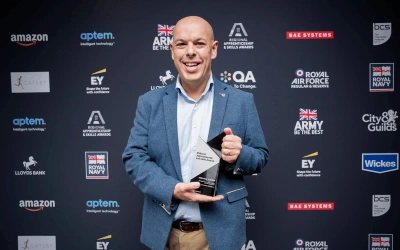It’s currently that time of year where I’m helping my daughter pick her GCSE subjects. It’s something many people reading this will have been through at some point. And it’s interesting because I believe there’s a bit of a journey for parents, as well as for children.
I often thought that when it came to this stage, I’d want my children to only do typical academic subjects. The safer options, if you like. The same options I chose when I was in that position. But over the last few years, a number of factors have made me think differently.
Firstly, my job at Lorien sees me speak with some of the most exciting technology businesses in the North-West on a daily basis. I see, first-hand, the exciting opportunities there are in this space. Then, a couple of months ago, Lorien hosted a presentation evening with Applied Futurist Tom Cheesewright was the guest speaker. I listened to the points he made that evening, and they really struck a chord – particularly, when he spoke about the education system.
All this, combined with the fact that technology is the single biggest driver of the modern world, have made me rethink a few things. But I also believe there are a few areas where we need some real improvement for the next generation.
Soft skills
One of the main points Tom made was that there’s not enough of a focus on soft skills. Things like communication and creativity – many students are leaving the education system without these.
It means that when they step into the world of work, it’s companies who are having to teach them.
This is one of the reasons I’d like my daughter to do some subjects which will help develop those skills. For example: Drama, Music, or design subjects. These will develop her creativity and give her experience of things like presenting and selling ideas to her peers – skills, which in a few years’ time, she’ll need on a regular basis.
These skills are very much sought-after in the STEM world – especially, the ability to communicate complex subjects, sometimes in an easier-to-understand manner. They can only enhance your career prospects. As an example, the Chief Executive of GSK, Emma Walmsley, studied Classics and Modern Languages!
Practical programming
I’ll have to be blunt – I don’t believe the education system is fit for purpose when it comes to developing programming skills. I do have a bit of sympathy. The education system is, by its very nature, a slow burn system. It’s almost impossible for it to keep up with the pace at which tech is changing.
Take Python, for example. It’s one of the most in-demand skills at the moment (last year, it was more Googled by Americans than Kim Kardashian!). It will continue to rise in popularity, especially as it’s a lot easier for beginners to pick up than, for example, Java. But if your 12-year old was learning Python today, would it still be as relevant by the time they get into the world of work?
A few years ago, our National Curriculum began phasing out the old ICT subject and replaced it with Computer Science. This phasing out has still not completely happened – at many schools, the GCSE subject is still ICT and it’s still more centred around software such as Excel. Quite frankly, many students are being taught admin skills rather than programming skills, and this is a worry.
But even with the introduction of Computer Science, we’re not seeing enough of a success. In 2018, the number of students leaving school with a Computer Science GCSE actually declined by 22,850 (16.6%). There’s also a struggle in getting enough teachers for this – just 47% have a relevant GCSE, a number which drops to 20% in the most deprived schools.
I personally think schools need to adopt a more partnership-based model. Encourage experts from businesses to visit schools and pass on skills and knowledge. At the same time, they should be more open to arranging placement opportunities at those same businesses.
This creates another avenue for students who have an interest in tech, but don’t want to move onto a full-time college course. By networking with these businesses during school years, they are giving themselves potential job opportunities when they leave school.
Unlocking creativity
At the heart of it, we need to find ways to get young people to think more creatively. This doesn’t just have to be in school either.
For example, are we encouraging them to join local sports clubs, learn how to bake, or take part in performance workshops? As well as creativity, they build up key skills in leadership and the ability to think in a critical way. While everybody has their own way of raising children, I don’t agree with the purely academic approach which sees them come home and head straight to the table to do their homework!
In London, there are examples of youth clubs and community centres running coding activities. I think this is excellent, and it’s something I’d like to see more of in the North, as it makes tech more fun. While computers are no longer seen as a geeky subject, we still need to find ways to make it appealing to the younger generation.
Some of the most successful techies around developed their skills by running side projects or taking part in coding challenges. In fact, many of the businesses I work with actually ask questions around this in their job interviews – they want to know the people they hire are passionate about tech.
So, when the time comes, what advice will I give my daughter about choosing her GCSEs?
When I reflect on my own choices, I realise that I was led down an academic path where it felt that anything ‘softer’ than STEM or humanities shouldn’t be trusted. But after over 16 years in work, and a career history in both nursing and sales, I realise that it takes all types to succeed. And the best minds are those open to adapting.
My advice to her will be to broaden her knowledge, learn both practically and academically from others, and to develop her creativity. Technologists can follow these rules too – stretching themselves to think beyond learning code and towards the art of the possible. What subjects she picks are ultimately up to her; it’s the mentality to learn and adapt that matters.







